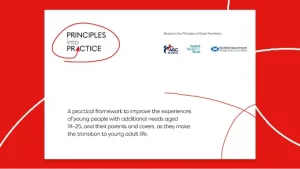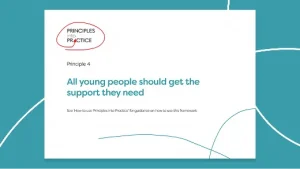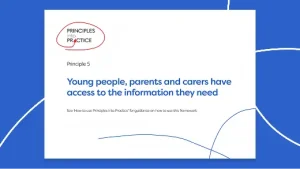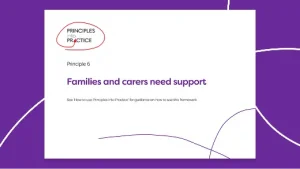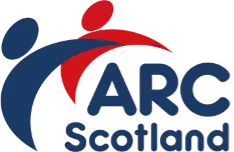Principles into Practice
A practical framework to improve the experiences of young people with additional needs aged 14-25, and their parents and carers, as they make the transition to young adult life.
Based on the Principles of Good Transitions
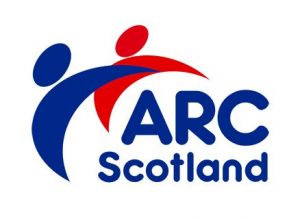

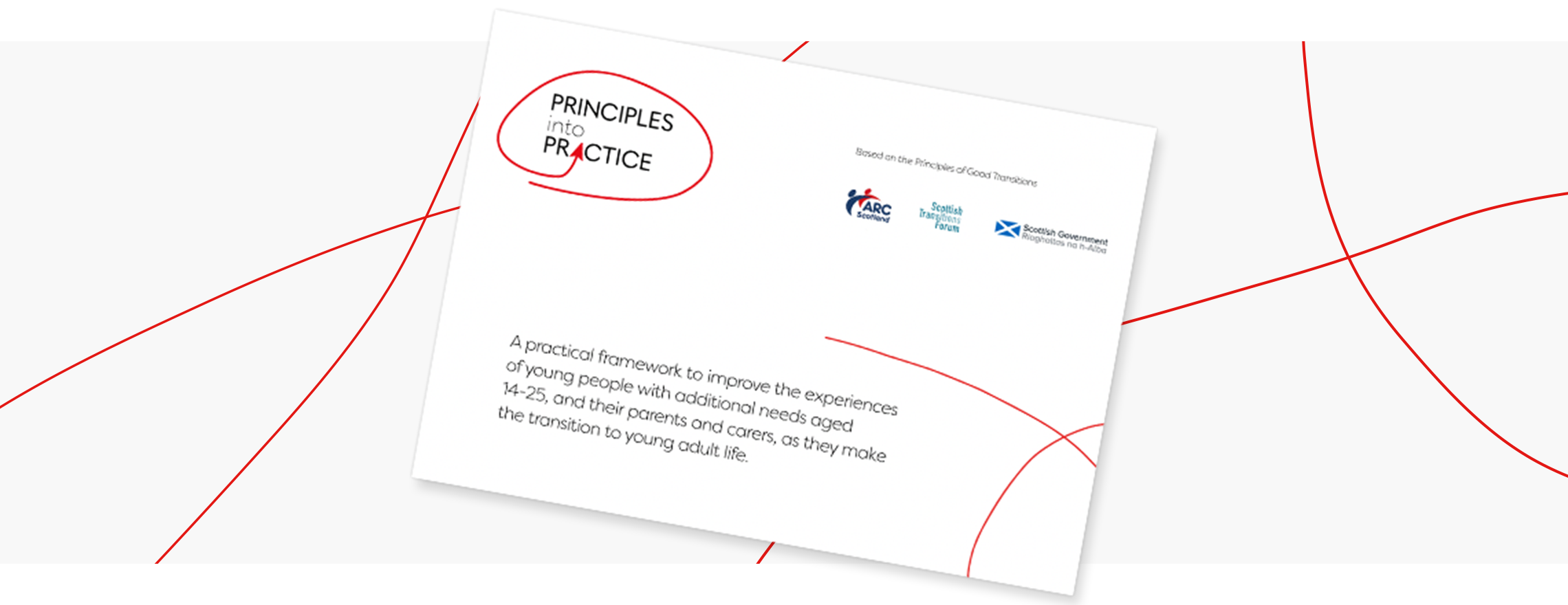
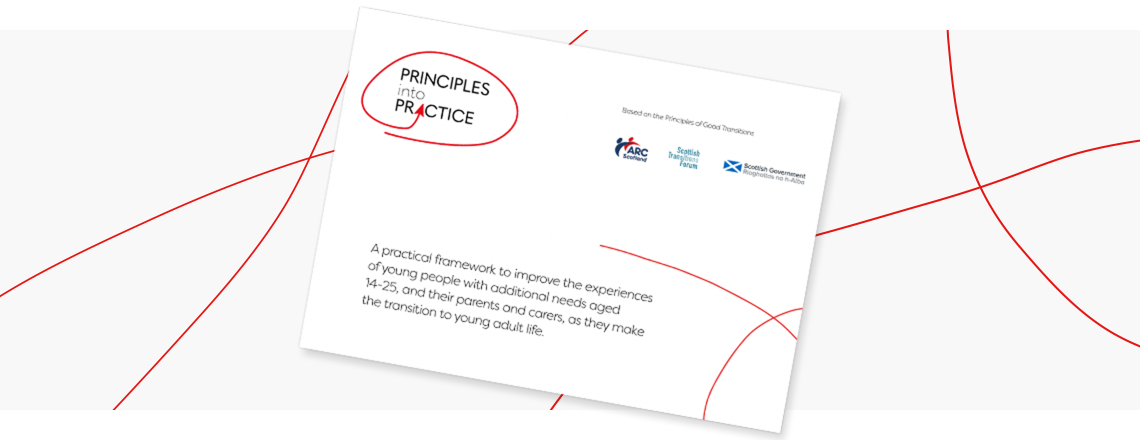
Introduction to Principles into Practice
Principles into Practice is a practical framework to improve the experiences of young people with additional needs aged 14-25, and their parents and carers, as they make the transition to young adult life in Scotland. It is intended to be used by strategic leads, policy makers and practitioners who are responsible for transitions in their local authority area
It can also be used by individual services and teams. However long term sustainable improvements are more likely to be achieved when working in collaboration with others, with a strategic commitment at a local authority level.
Transition is a critical and formative experience for young people and their parents and carers. It should be viewed as an unfolding process over several years, and not a single ‘event’ such as leaving school.
Most young people who require additional support tell us they are optimistic about their future and are keen to venture into the next phase of their lives but need support to be more empowered, to be listened to and to direct the process. Most harbour a broad range of hopes and ambitions and are excited by the prospect of taking control of their own lives but find their dreams and aspirations are often stifled by a system they don’t understand. Providing them with the extra support they need to transition effectively and with optimism should be viewed as an investment in the future.
You can find out more about the views and experiences of young people here.
Principles Into Practice invites you to explore and improve practice within your own organisation and to work in partnership with others to better co-ordinate support across all services.
This will involve you working with external partners as well as with young people and their parents and carers. It will enable you to collectively meet legislative and regulatory requirements while supporting the implementation of a range of Scottish Government policy areas including: Getting it Right for Every Child (GIRFEC), Additional Support for Learning, and the United Nations Convention on the Rights of the Child (UNCRC).
Principles into Practice should be used in conjunction with the Principles of Good Transitions. These bring together everything the law requires to support transitions, and what research tells us about the approaches that work best. It will help to ensure you are aware of all your legislative and statutory duties.
Find out more about the Principles of Good Transitions.
It will benefit all young people between the ages of 14 to 25 who need additional support, and their parents and carers. This includes young people with complex support needs and those who may not meet the eligibility criteria for adult social care support.
It benefits young people with learning disabilities, autism, physical disabilities, sensory impairments, complex health conditions, mental health difficulties, and young carers and those who are care experienced (including young people with experience of secure care or young offender Institutions). It also benefits the parents and carers of these young people.
Throughout Principles into Practice, we use the term ‘additional support needs’. This is a legally defined term which is about the support provided to pupils to overcome barriers to their learning in school and which comes from the Education (Additional Support for Learning) (Scotland) Act 2004. This means the legal requirements are in place until a pupil leaves school, and so do not apply up to the age of 25.
However, in Principles into Practice this term has been applied in a much broader sense and has been extended to mean the support anyone may need to overcome barriers related to learning, life and work, up until the age of 25. This is beyond the requirements of the Additional Support for Learning legislation.
Where ‘parents and carers’ are mentioned, this includes anyone who fulfils this role within a young person’s life, including kinship carers and foster carers.
It has been developed to enable all strategic leads, policy makers and practitioners who are responsible for transitions to work together to improve the experiences of young people and their parents and carers in their local area.
This includes managers, commissioners, planners, policy makers, directors and key frontline practitioners from the following professions:
- Paediatric and adult health services (including mental health)
- Child and adult social work and social care
- Education – secondary, further and higher
- Employment and training
- Third sector
- Public sector services (e.g. housing, welfare)
- Youth justice
- Advocacy
- Local government
- Scottish Government
- Young people
- Parents and carers
- Support more young people with additional needs to reach their potential
- Provide families with the right support
- Review your existing services and evaluate the difference you are making
- Support joined up and co-ordinated approaches to transitions across your local area
- Carry out your statutory duties as set in legislation and underpinned by rights
- Make best use of limited resources and avoid duplicating effort
- Provide a clear rationale for planning and commissioning decisions
- Establish a preventative, rather than reactive, model of care and support
- Support national policy priorities
The Scottish Transitions Forum is a network with over 1,000 members, including professionals from all relevant sectors, young people and their parents and carers. It is facilitated by ARC Scotland.
Our aim:
To improve the experiences of young people (14-25) who require additional support who are making the transition to young adult life.
Our objectives:
- Support joined-up working across all services
- Continually improve knowledge, motivation and practice
- Inform and empower young people and their carers Membership of the
- Scottish Transitions Forum is free and open to anyone who shares our aim.
How to use Principles into Practice
Practical steps are given for you to deliver each of the seven ‘Principles of Good Transition’ from both within your service and through working with others.
‘In our organisation’ invites you to explore and develop practice within your own organisation.
‘Working with others’ invites you to work in partnership with others in your local authority area to better co-ordinate support across all services. This might include working with external agencies such as health, education, social care and provider organisations, as well as with parents, carers and young people.
For each Principle, we provide descriptors for how your planning and practice might look across three categories: ‘Assessing’, ‘Improving’ and ‘Delivering’.
Assessing: We are developing plans to embed the Principle in our service and are making connections with partners from other sectors.
Improving: We are working within our service and with partners from other sectors, young people, parents and carers to embed the Principle into our practice. This may include piloting new approaches or increasing the consistency of our practice.
Delivering: We are working collaboratively with our partners, young people, parents and carers to fully deliver the Principle. We are evaluating the difference we make, analysing our findings and refining our approaches. Compass will help you to gather this data.
Rather than including every consideration, we have sought to identify and define the essential elements upon which sound planning and practice should be built. We ask you to consider which descriptor best describes the stage you are at in your service and local area and to use the framework to identify and plan which further actions you wish to take.
First steps From our learning so far we have identified that the steps below will put you in the best position to fully implement Principles into Practice.
As a starting point, you may consider using Principles into Practice with a specific service area (e.g. young people attending a specialist education provision), a geographic locality within your local authority, or with a particular beneficiary group (e.g. young autistic people). Alternatively, you may wish to use it for all young people who require additional support throughout your authority area. Whatever you choose, your work should span all seven ‘Principles’ and involve a wide range of partners.
Achieving a joint commitment to improvement between relevant agencies is therefore your first step. You can also use it within individual services and teams. However long term sustainable improvements are more likely to be achieved when working in collaboration with others, with a strategic commitment at a local authority level.
The ‘getting started’ phase of the work may take longer than you expected, however it is essential to ensure the sustainability and impact of your work. To help you get started we suggest the following steps:
1 Contact ARC Scotland
We will discuss the support and resources available to you.
2 Gain sufficient level of agreement and ‘sign off’ before beginning work
It is important the agreement and commitment to the programme is jointly agreed by children’s, adult and education services.
3 Appoint at least 2 strategic leads
Strategic leads for this work should include one from education and one from adult services. They should be able to provide leadership in what can be a complex area of work and report at a strategic level in your local authority. If possible, a third lead should be appointed from children’s services.
4 Bring local partners together within a local transitions forum or equivalent
They will be responsible for sharing information, building collective understanding, agreeing priorities and developing joint plans of action.
The Principles into Practice framework
Data and Evaluation
Involvement and feedback from young people, parents, carers and practitioners is essential to enable you to continually refine and improve what you do based on people’s experiences.
To support this, ARC Scotland has developed ‘Compass’, a digital tool that provides information and gathers feedback from these groups. Compass is freely available to all young people who require additional support and their parents and carers in Scotland. There is also a version of Compass dedicated to the professionals involved in the transitions.
With a data sharing agreement in place, ARC Scotland can provide collated and anonymised data from Compass users to local authorities. This data can help to inform, refine and improve both planning and practice and the application of Principles into Practice in your area, by helping you to highlight priorities for improvement.
Find our more about Compass in the ‘Data and Evaluation’ section.

